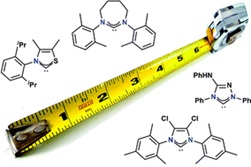The chemistry of stable carbene molecules has been of interest to me for many years, from an undergraduate lecture on organometallic chemistry to recent research on diamond chemistry and surface modification.
Unlike their unstable counter-parts, the stable versions have controllable and versatile chemistry. This has led to the creation of hundreds of these stable carbenes for various applications. The overwhelming literature on the topic makes it difficult to compare carbene chemistry, introduce oneself to the field, or pick suitable carbenes for any given application.
Recently, navigating the literature has been made easier for one class of carbenes – the N-heterocyclic carbenes. David J. Nelson1 and Steven P. Nolan have written a HOT review in Chemical Society Reviews which categorizes N-heterocyclic carbenes based on their steric and electronic properties.
They do so with the aid of chemical ‘metrics’, deriving from NMR, IR, electrochemical and computational data. Each metric enables different features of carbene chemistry to be probed. For example, parameters derived from IR data are used to quantify the extent of d to π* backbonding between the carbene and a metal centre. In this manner, the results of over 300 N-heterocyclic carbenes have been filtered by the authors to further a comprehensive understanding of N-heterocyclic carbene chemistry.
This review is valuable to the newcomer and experienced carbene chemist, alike. It lays the framework for a more systematic approach to carbene chemistry, in which the molecules are tailored for specific organometallic, catalytic, and surface chemistry.
1. No relation to the author of the blog
Read this Chem Soc Rev Review article in full:
Quantifying and understanding the electronic properties of N-heterocyclic carbenes
David J. Nelson and Steven P. Nolan
Chem. Soc. Rev., 2013, Advance Article
DOI: 10.1039/C3CS60146C
Geoff Nelson is a new guest web-writer for Chemical Science. He currently works as a post-doctoral research associate in Dr David Payne’s research group in the Department of Materials at Imperial College, London. Geoff’s current research concerns the synthesis and characterization of post-transition metal oxides for use in the energy sector. His other research interests include carbon-based materials, biophysical chemistry, electrochemistry, and surface science.











